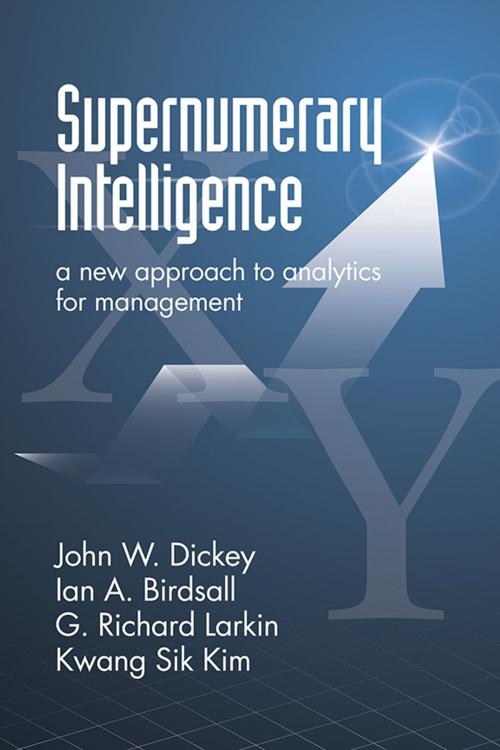Supernumerary Intelligence
A New Approach to Analytics for Management
Business & Finance, Management & Leadership, Management Science, Management| Author: | John W. Dickey, Ian A. Birdsall, G. Richard Larkin, Kwang Sik Kim | ISBN: | 9781623968311 |
| Publisher: | Information Age Publishing | Publication: | February 1, 2015 |
| Imprint: | Information Age Publishing | Language: | English |
| Author: | John W. Dickey, Ian A. Birdsall, G. Richard Larkin, Kwang Sik Kim |
| ISBN: | 9781623968311 |
| Publisher: | Information Age Publishing |
| Publication: | February 1, 2015 |
| Imprint: | Information Age Publishing |
| Language: | English |
Much of our life is consumed looking for quantitative relationships. For example, How much more sleep do I need at night to make me feel better? How many calories do I need to eliminate to lose weight? How much larger does my budget on the job need to be for me to be more effective? All these quantitative questions are preceded, and depend on, qualitative questions. For example, before I decide how much extra sleep I need at night, I need to determine if extra sleep will actually make me feel better. In another example, I need to determine if a larger budget will make me more effective on the job, before I think about how much more money I will need. What elements influence job performance, and how do they interact? We spend much of our life trying to find answers to such quantitative and qualitative questions. We are, then, in search of a kind of intelligence that includes numbers but is also above and beyond them. We call it 'supernumerary' intelligence (SI). To aid our quest for SI, we use Quantitative CyberQuest (QCQ) and the Public Administration Genome Project (PAGP) as useful tools. QCQ is a philosophy as well as an analytic tool that helps in exploring the supernumerary. QCQ is particularly wellsuited for sorting out variables as well as their interrelations. It involves a combination of statistics, systems analysis, research methodology, qualitative research, and artificial intelligence. QCQ also provides a relatively easy to understand but still powerful set of tools and guidance mechanisms to pilot (the 'Cyber' part) users in their 'Quest' for supernumerary relationships.
Much of our life is consumed looking for quantitative relationships. For example, How much more sleep do I need at night to make me feel better? How many calories do I need to eliminate to lose weight? How much larger does my budget on the job need to be for me to be more effective? All these quantitative questions are preceded, and depend on, qualitative questions. For example, before I decide how much extra sleep I need at night, I need to determine if extra sleep will actually make me feel better. In another example, I need to determine if a larger budget will make me more effective on the job, before I think about how much more money I will need. What elements influence job performance, and how do they interact? We spend much of our life trying to find answers to such quantitative and qualitative questions. We are, then, in search of a kind of intelligence that includes numbers but is also above and beyond them. We call it 'supernumerary' intelligence (SI). To aid our quest for SI, we use Quantitative CyberQuest (QCQ) and the Public Administration Genome Project (PAGP) as useful tools. QCQ is a philosophy as well as an analytic tool that helps in exploring the supernumerary. QCQ is particularly wellsuited for sorting out variables as well as their interrelations. It involves a combination of statistics, systems analysis, research methodology, qualitative research, and artificial intelligence. QCQ also provides a relatively easy to understand but still powerful set of tools and guidance mechanisms to pilot (the 'Cyber' part) users in their 'Quest' for supernumerary relationships.















